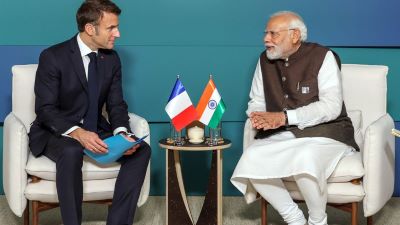Context:
India and France, bound by a longstanding 'Strategic Partnership,' witnessed French President Emmanuel Macron as the chief guest at India's Republic Day, underscoring the depth of their relationship. The synergy between the two nations, rooted in shared values of strategic autonomy and multipolarity, has evolved since French President Jacques Chirac's visit in 1998 when the first Strategic Partnership was established. The recent visit solidifies the personal ties between Macron and Indian Prime Minister Narendra Modi, emphasizing the significance both leaders attach to this unique bilateral relationship.
Origins of Strategic Convergence:
The foundation of the India-France 'Strategic Partnership' was laid in 1998 when President Chirac declared India's exclusion from the global nuclear order as an anomaly. France demonstrated a nuanced understanding of India's security concerns post its nuclear tests, becoming the first P-5 country to endorse India's claim for a permanent UN Security Council seat. Both nations, though differing in historical alignments, valued strategic autonomy and embraced multipolarity in the post-Cold War era. France's withdrawal from NATO's integrated military command in 1966 mirrored India's non-alignment stance.
Recognizing the shifting geopolitical focus to the Asia-Pacific, France identified India as a preferred partner in the region, aligning with India's pursuit of strategic autonomy. The convergence of their 'civilization exceptionalism' and reluctance to impose their values on each other laid the groundwork for a relationship built on mutual respect.
Building the Partnership:
The bilateral relationship between India and France extended beyond nuclear cooperation, evolving into a comprehensive strategic dialogue. The defense collaboration, spanning submarines, aircraft, and technology sharing, has been a hallmark of their partnership. The government-to-government agreement for 36 Rafale aircraft, coupled with technology transfer, bolstered India's aerospace industry. Macron's recent visit marked the conclusion of the India-France Defense Industrial Roadmap, reflecting the commitment to self-reliance. Agreements between Tata Advanced Systems Ltd., Airbus, and Safran signify the growth of indigenous defense capabilities.
In the space domain, cooperation initiated in the 1960s faced challenges but was revived through strategic dialogue. Joint missions between ISRO and CNES, along with collaborations on space launches, illustrate the widening scope of their partnership. The Defense Space Agency in India and France's transition to the Air and Space Force indicate a shared interest in optimizing space domain awareness.
Broadening and Deepening the Partnership:
Moving beyond government domains, India and France have diversified their collaboration into commercial and civilian realms. Joint working groups have been established in various sectors like agriculture, environment, civil aviation, IT, and telecom. Success stories include the growing number of Indian students pursuing higher education in France, with a target of 30,000 by 2030. Addressing visa issues and operationalizing the Young Professionals Scheme under the Migration and Mobility Partnership Agreement further facilitate people-to-people exchanges.
The commercial landscape boasts nearly 1,000 French companies in India and 39 from the CAC 40, while 150 Indian businesses have a presence in France. In a post-Brexit scenario, France emerges as an entry point for India into Europe and the Francophonie. The maturity and resilience of the India-France ties are evident in their ability to handle differences privately, reflecting a quarter-century-long relationship.
Challenges and Ongoing Developments:
While the India-France 'Strategic Partnership' has witnessed remarkable progress, both nations face the challenge of translating government-level collaborations into broader societal and commercial interactions. The establishment of joint working groups is a positive step, yet sustained efforts are required to deepen these connections across diverse sectors. French assistance in setting up a Sorbonne University campus in India and the revision of rules for foreign universities can amplify educational collaboration.
The defense and space collaborations have showcased significant strides, but sustained commitment is essential to keep pace with evolving technologies and geopolitical dynamics. Ongoing negotiations for the acquisition of three Scorpenes and 26 Rafale M aircraft underline the commitment to enhancing defense capabilities. The defense industrial roadmap and collaborations in aerospace technology signify a mutual drive towards self-sufficiency.
Conclusion:
In conclusion, the India-France 'Strategic Partnership' stands as a testament to the depth and resilience of bilateral ties. From the initial nuclear cooperation to comprehensive defense and space collaborations, the relationship has grown multifaceted. The recent visit by President Macron reaffirms the personal rapport between leaders and underscores the importance they attach to this unique partnership. As both nations continue to navigate global challenges, the maturity exhibited in handling differences privately and the ongoing efforts to broaden engagement beyond government levels highlight a relationship that has evolved and thrived over a quarter-century. The commitment to self-reliance (atma nirbharta), educational exchanges, and commercial interactions reflects a partnership that goes beyond strategic considerations to encompass the shared values and aspirations of India and France.
|
Probable Questions For UPSC Mains Exam
|
Source – The Hindu







